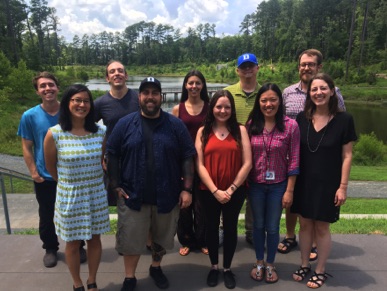
THE TUNG LAB
Research in the Tung lab focuses on the interplay between genes and behavior. How does social behavior influence genetic variation and gene regulation? How do genetic differences and gene regulation reciprocally influence behavior? And what are the implications of this relationship for evolutionary biology and human health?
We are located at Duke University, in Durham, North Carolina, in the Departments of Evolutionary Anthropology and Biology.
023 Biological Sciences Building
125 Science Drive
Durham, NC 27708
Office: 919-668-4912
Lab: 919-684-3910
Fax: 919-660-7348
Photo Credit: Noah Snyder-Mackler
Photo Credit: Noah Snyder-Mackler
Interested in our work? We're looking for talented students and post-docs to join us!
News
11 January 2022: Two new papers are out in Phil Trans B today, as part of a special issue on animal social hierarchies! Check out Noah Simons's work on behavioral mediators of social status in rhesus macaques and Jordan Anderson's paper on gene regulatory signatures of social status and social bond strength in baboons.
21 August 2021: Check out a pair of recent lab preprints! Behavioral contributions to social status effects on gene regulation and other traits in rhesus macaques, led by former post-doc Noah Simons AND the evolutionary history and selective consequences of admixture in the Amboseli baboons, led by former and current PhD students Tauras Vilgalys and Arielle Fogel!
22 June 2021: Post-doc Rachel Johnston's study of genotype effects on the response to virus in wild wolves, now out in Journal of Heredity!
16 June 2021: Limits on the evolution of longevity across primates! Comparative work across multiple long-term primate field studies, led by Fernando Colchero and Susan Alberts, out in Nature Comm today.
31 May 2021: New bioRxiv preprint on distinct gene regulatory signatures of social status and social integration in the Amboseli baboons, led by grad student Jordan Anderson!
21 April 2021: New Science Advances paper! Chronic glucocorticoid exposure predicts shortened lifespan in female Amboseli baboons, led by Fernando Campos and Susan Alberts.
12 April 2021: New eLife paper! Morphological and genomic shifts caused by transitions to breeder status in the Damaraland mole-rats of the Kalahari, led by post-doc Rachel Johnston.
4 April 2021: New eLife paper! High ranking baboon males exhibit accelerated aging, based on an epigenetic clock calibrated to the Amboseli baboons! Led by Jordan Anderson and Rachel Johnston.
4 April 2021: New PNAS paper--a collaboration with Seb Calvignac-Spencer, Jan Gogarten, and many primate biologists showing that primate phageomes are structured by phylogeny and social structure.
New preprint on genetic ancestry and male-female affiliative behavior in the Amboseli baboons, led by PhD student Arielle Fogel!
New article in PNAS: no evidence that accelerated maturation evolved as an adaptive response to early adversity! Led by our collaborators in the Archie lab, especially PhD student Chelsea Weibel!
Welcome new PhD student, Shuyu He! We're excited that you're joining us!
New preprint on Damaraland mole-rat breeding effort and morphology led by lab post-doc Rachel Johnston!
New review in Current Opinions in Genetics & Development! Led by Jordan Anderson and Tauras Vilgalys: expanding our view of primate genomics to new species and study systems.
Launch of the Animal Models for the Social Dimensions of Health and Aging Research Network! Sign up for news and funding opportunities here, or follow on Twitter @animalsocaging.
Congratulations to post-doc Ryan Campbell on receiving an NIH NRSA Postdoc Fellowship!
New review in Science: a comparative take on the social determinants of health across humans and other social mammals.
New methods paper on meQTL mapping, led by the Zhou lab!
New PNAS paper on social history and gene regulation in rhesus macaques, in collaboration with the Barreiro lab!
Thank you to the MacArthur Foundation for recognizing Jenny as a 2019 MacArthur Fellow!
Intergenerational effects of early adversity in the Amboseli baboons: collaborative work out in eLife on the long arm of early life insults, led by Alberts lab grad student Matthew Zipple.
New perspective piece led by lab post-doc Noah Simons! Context-dependent effects of social status on gene regulation.